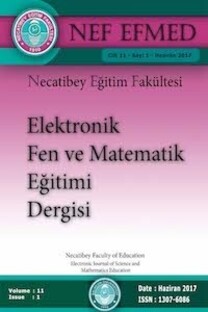Sex differentials in students' achievement and interest in geometry using games and simulations technique
___
- Açıkgöz, K. Ü. (1996). Etkili öğrenme ve öğretme. (3. baskı). Kanyılmaz Matbaası, İzmir.
- Akdeniz, A. R. (2005). Problem çözme, bilimsel süreç ve proje yönteminin fen eğitiminde kullanımı, Çepni, S. (Ed.) Kuramdan Uygulamaya Fen ve Teknoloji Öğretimi, Pegem A Yayıncılık, Ankara.
- Altun, M. (2000). İlköğretimde problem çözme öğretimi. Milli Eğitim, 147.
- Azuma, T. & Nagao, K. (2008). An inquiry into the reproduction of physics-phobic children by physics-phobic teachers. arXiv:0803.3167v2 [physics.ed-ph], Retrieved from http://arxiv.org/abs/0803.3167
- Benckert, S. (1997). Context and conversation in physics education. Retrieved from http://www.nshu.se/download/3018/benckert_sylvia_97.pdf
- Büyüköztürk, Ş., Çakmak, E.K., Akgün, Ö.E., Karadeniz, Ş. ve Demirel, F. (2008). Bilimsel araştırma yöntemleri. Pegem Akademi Yayıncılık, Ankara.
- Çepni, S. (2009). Araştırma ve proje çalışmalarına giriş. Üçüncü Baskı, Celepler Matbaacılık, Trabzon.
- Glynn, S. & Koballa, T. R. (2005). The contextual teaching and learning instructional approach. In R. E. Yager (Ed.), Exemplary Science: Best Practices In Professional Development (Pp. 75–84). Arlington, Va: National Science Teachers Association Press.
- Güzel, H. (2004). Genel fizik ve matematik derslerindeki başarı ile matematiğe karşı olan tutum arasındaki ilişki. Türk Fen Eğitimi Dergisi, 1 (1), 49-58.
- Heller, P., & Hollabaugh, M. (1992). Teaching problem solving through cooperative grouping. Part 2: Designing problems and structuring groups. American Journal of Physics, 60, 637–644.
- Hennessy, S. (1993). Situated cognition and cognitive apprenticeship: implications for classroom learning. Studies in Science Education. 22, 1–41.
- Hoffmann, L., Hausler, P. & Lehrke, M. (1998). Die IPN-Interessenstudie Physik. Kiel: IPN.
- Merriam S. B. (1988). Case study research in education: A qualitative approach. Jossey-Bass, San Francisco.
- Murphy, P. (1994). Gender differences in pupils’ reactions to practical work. Teaching Science, Ed R Levinson (London: Routledge).
- Park, J. & Lee, L. (2004). Analyzing cognitive and non-cognitive factors involved in the process of physics problem-solving in an everyday context. International Journal Of Science Education, 29, 1577–1595.
- Rennie, L. J. & Parker, L. H. (1996). Placing physics problems in real-life context: students' reactions and performance. Australian Science Teachers Journal, 42 (1).
- Sharma, B. K. (2004). Can we make physics popular? Proceeding of Second Annual Conference and National Conference On “How To Make Physics Popular?”, Jaipur, India, 11-13.
- Shiu-sing, T. (2005). Some reflections on the design of contextual learning and teaching materials. Retrieved from Contextual Physics in Ocean Park http://resources.emb.gov.hk/cphysics
- Taasoobshirazi, G & Carr, M. (2008). A review and critique of context-based physics instruction and assessment. Educational Research Review, 3 (2), 155-167.
- Van De Walle John A. (1994). Elementary school mathematics. Virginia Commenralth University, Longman.
- Whitelegg, E., & Parry, M. (1999). Real-life contexts for learning physics: meanings, issues, and practice. Physics Education, 34, 68–72.
- Yam, H. (2005). What is contextual learning and teaching in physics? Retrieved from http://www.phy.cuhk.edu.hk/contextual/approach/tem/brief_e.html.
- Yaman, M., Dervişoğlu, S. & Soran, H. (2004). Ortaöğretim öğrencilerinin derslere ilgilerinin belirlenmesi. Hacettepe Üniversitesi Eğitim Fakültesi Dergisi, 27, 232-240.
- Yin, R. (1994). Case study research design and methods. Second Edition, Sage Publications, California.
- ISSN: 1307-6086
- Yayın Aralığı: 2
- Başlangıç: 2007
- Yayıncı: Balıkesir Üniv. Necatibey Eğitim Fak.
Emmanuel E. ACHO, Benjamin I. IMOKO, John T. AJAI
Dr Emmanuel E ACHOR, Benjamin İ. IMOKO, John T AJAİ
Fen ve Teknoloji Dersindeki Performans Görevlerine Yönelik Veli Tutumlarının Belirlenmesi
Cengiz TUYSUZ, Cengiz TÜYSÜZ, Yunus KARAKUYU, Yunus KARAKUYU, Erdal TATAR
Gurcan UZAL, Aytekin ERDEM, Fatma ÖNEN, Ayla GÜRDAL, Ayla GÜRDAL
Ortaöğretim Öğrencilerinin Görüntü ve Düzlem Aynada Görüntü Oluşumuna İlişkin Kavramsal Anlamaları
Aysel KOCAKÜLAH, Neşet DEMİRCİ
Perceptions of scientists: A comparative study of fifth graders and fourth year student teachers
Fizik Öğretmen Adaylarının Geliştirdikleri Yapılandırmacı Öğretim Etkinliklerinin Değerlendirilmesi
ALİ RIZA AKDENİZ, Ömer Engin AKBULUT
